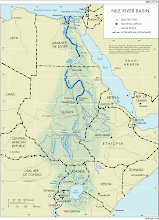Sharing land and water resources across borders – the case-study of Gambella region, Western Ethiopia
The aim of this proposal is to analyse contemporary crisscrossing borderland issues in Gambella, a region located in the Western boundary of Ethiopia with Sudan. The focus will be mainly in transboundary land and water issues. Gambella is a water-abundant region, home of farmers and pastoralist communities that have been moving throughout history between Ethiopian and Sudanese territories. The rivers Baro and Akobo have origins in Ethiopia, cross the administrative political borders and join in the southern Sudanese territory becoming the Sobat River, which will later join the Nile River. The land of the region is extremely fertile and it is in continuum with the swamps of the Sudd region of Sudan. Water and land resources have a strong transboundary character in this region.
Gambella is an example of a complex environmental ecosystem that has been shared historically by the indigenous populations, such as the Anuak (sedentary communities) and the Nuer (nomadic communities), among others. Patterns of cooperation, but also of conflict, have marked the relations between the diverse groups. The race for resources (e.g. gold, ivory, slaves) in the region has roots in the colonial era, when the English administration and the Ethiopian Empire competed for the political control of the region. However, the competition for land and water resources became acute during the 1980s when a large number of outsider populations arrived to the region. Newcomers came from the two sides of the administrative borders. On one hand, populations arrived from the Ethiopian highlands in result of the resettlement policies pursued by the central government of Addis Ababa. On the other hand, civil populations, refugees and military contingents arrived from Southern Sudan in result of the resume of the civil war in Sudan, resulting on spill over effects in the Ethiopian side.
These environmental, social, economic and political pressures have transformed the Gambella region in a prone-conflict area. The internal and regional dynamics have concomitantly affected the political relations between the diverse groups. Currently, the relationship between the Gambella region and the federal government of Ethiopia put in evidence an uneasy complex political puzzle. Furthermore, the unfinished peace process in Southern Sudan represents additional political stress for the region.
This research is the result of the literature review available about the region and a fieldwork visit to Gambella region in January 2008. The preliminary conclusion is that the lines of conflict(s) are blurred and difficult to grasp, and research may eventually be a useful tool to prevent further conflicts. The political manipulation of identities, already pointed out by several observers, can turn the problem more sensitive in the near future.
The parallelism between Gambella (Ethiopia) and Darfur (Western Sudan) situations might be an overstatement, but brings to mind that environmental-based conflicts can easily turn into major political and armed conflicts.
AEGIS-AFRICAN STUDIES IN EUROPE
CORTONA SUMMER SCHOOL 2008
BORDERS AND BORDER-CROSSINGS IN AFRICA
Cortona, Tuscany, 16-22 June 2008
Link: www.aegis-eu.org/pdf/CortonaProgramme2008.pdf
The aim of this proposal is to analyse contemporary crisscrossing borderland issues in Gambella, a region located in the Western boundary of Ethiopia with Sudan. The focus will be mainly in transboundary land and water issues. Gambella is a water-abundant region, home of farmers and pastoralist communities that have been moving throughout history between Ethiopian and Sudanese territories. The rivers Baro and Akobo have origins in Ethiopia, cross the administrative political borders and join in the southern Sudanese territory becoming the Sobat River, which will later join the Nile River. The land of the region is extremely fertile and it is in continuum with the swamps of the Sudd region of Sudan. Water and land resources have a strong transboundary character in this region.
Gambella is an example of a complex environmental ecosystem that has been shared historically by the indigenous populations, such as the Anuak (sedentary communities) and the Nuer (nomadic communities), among others. Patterns of cooperation, but also of conflict, have marked the relations between the diverse groups. The race for resources (e.g. gold, ivory, slaves) in the region has roots in the colonial era, when the English administration and the Ethiopian Empire competed for the political control of the region. However, the competition for land and water resources became acute during the 1980s when a large number of outsider populations arrived to the region. Newcomers came from the two sides of the administrative borders. On one hand, populations arrived from the Ethiopian highlands in result of the resettlement policies pursued by the central government of Addis Ababa. On the other hand, civil populations, refugees and military contingents arrived from Southern Sudan in result of the resume of the civil war in Sudan, resulting on spill over effects in the Ethiopian side.
These environmental, social, economic and political pressures have transformed the Gambella region in a prone-conflict area. The internal and regional dynamics have concomitantly affected the political relations between the diverse groups. Currently, the relationship between the Gambella region and the federal government of Ethiopia put in evidence an uneasy complex political puzzle. Furthermore, the unfinished peace process in Southern Sudan represents additional political stress for the region.
This research is the result of the literature review available about the region and a fieldwork visit to Gambella region in January 2008. The preliminary conclusion is that the lines of conflict(s) are blurred and difficult to grasp, and research may eventually be a useful tool to prevent further conflicts. The political manipulation of identities, already pointed out by several observers, can turn the problem more sensitive in the near future.
The parallelism between Gambella (Ethiopia) and Darfur (Western Sudan) situations might be an overstatement, but brings to mind that environmental-based conflicts can easily turn into major political and armed conflicts.
AEGIS-AFRICAN STUDIES IN EUROPE
CORTONA SUMMER SCHOOL 2008
BORDERS AND BORDER-CROSSINGS IN AFRICA
Cortona, Tuscany, 16-22 June 2008
Link: www.aegis-eu.org/pdf/CortonaProgramme2008.pdf








No comments:
Post a Comment